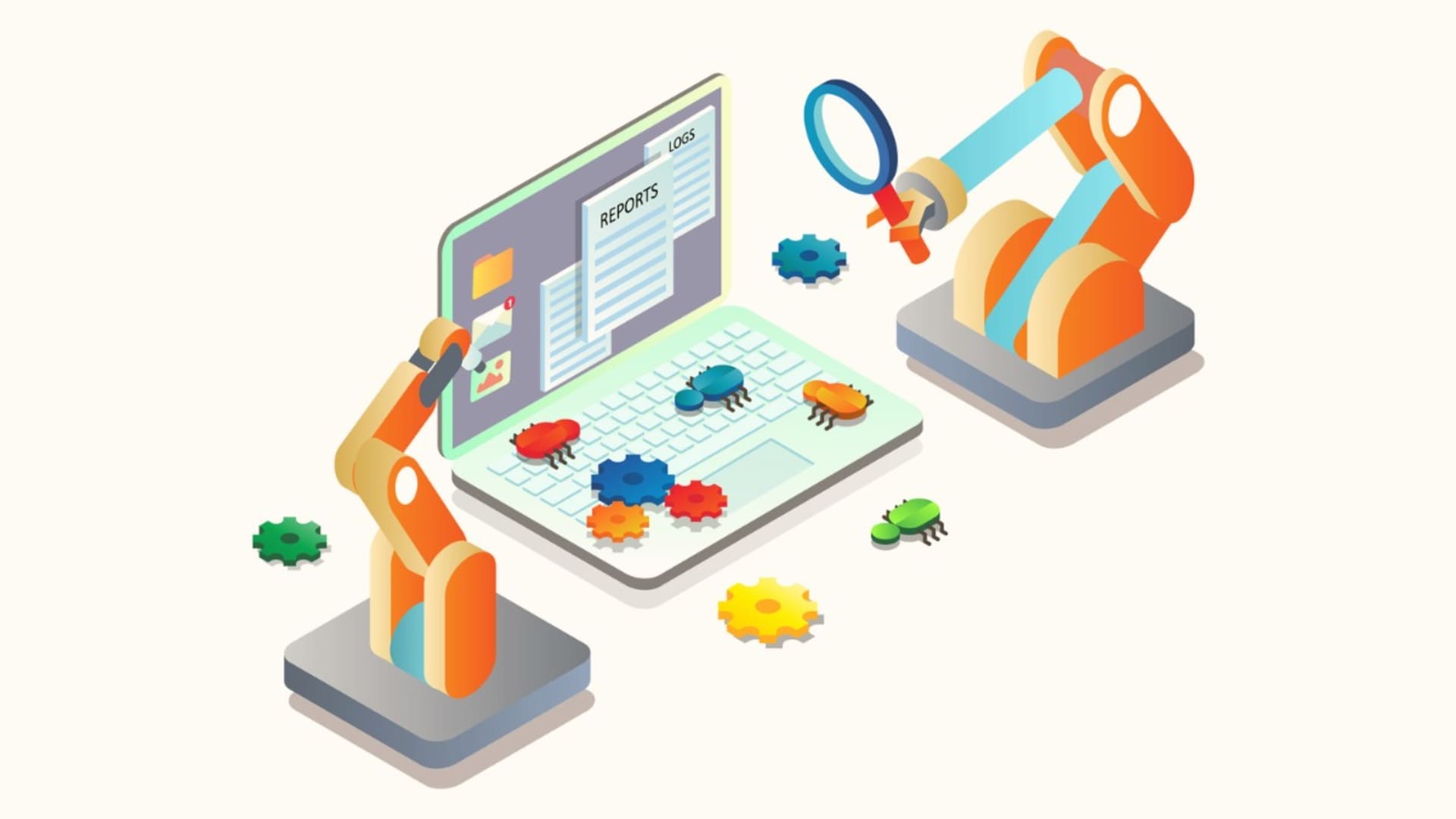QA & Software Testing Services
Access the top 1% of LATAM tech talent within 2 weeks. Mitigate risk by shipping higher-quality software with our QA and software testing services.
500+ companies rely on our top 1% tech talent.
QA and Software Testing Services We Provide
Manual Testing
Manual testing is a hands-on approach that captures nuances automation tools might miss, particularly for complex user interactions or areas where test automation is impractical. We identify bugs by leveraging exploratory testing, acceptance testing, and real-world simulations to verify that the software meets user expectations.
This comprehensive service covers the most popular software testing services: security, exploratory, ad-hoc, usability, localization, installation, error handling, and compatibility testing.
AI and ML-Driven Automation Testing
Set up a production line for quality checks with our automated software testing services. With AI and Machine Learning (ML), our testing adapts to application changes using self-healing scripts and learns from past test data to enhance defect prediction. This integration streamlines testing workflows, reduces script maintenance, and elevates overall software quality by using predictive analytics and self-healing scripts.
Regression Testing
Think of regression testing as a safety net. We use tools like Selenium, TestNG, and AI-powered visual testing platforms to make sure your software’s main functionalities work after updates. Advanced analytics pinpoint even subtle regressions in complex systems to maintain consistent software quality.
This iterative process involves running a set of pre-defined test cases—the result is fewer glitches, consistent software quality, and reliable performance of legacy features.
API Testing
Reliable APIs form the backbone of modern applications. Rigorous API testing confirms that your endpoints are functional, optimized, secure, and ready to handle real-world demands. We use tools like Postman, REST Assured, and contract testing frameworks to validate data flows, endpoint reliability, and security. Advanced API testing validates compliance, tests performance under load, and proactively identifies vulnerabilities.
Web and Mobile QA
In a world where users might jump from a high-end desktop to a mid-range smartphone, your websites and apps should look great and perform well on all browsers and devices. Our web and mobile quality assurance service focuses on responsive design and cross-platform compatibility for a seamless user experience. We also conduct accessibility testing to confirm your software is usable by people with disabilities.
Security Testing
Every day, a new company falls victim to a data breach. Our security testing services dive deep into your software's defenses, analyzing vulnerabilities from a hacker’s perspective.
We use leading tools like OWASP ZAP, Burp Suite, and AI-driven security platforms to assess vulnerabilities proactively. Our approach combines real-time anomaly detection, threat modeling, and vulnerability scanning to identify issues like SQL injection, cross-site scripting, and emerging attack vectors for software resilience against advanced threats.
Performance Testing
With our load and endurance tests, we simulate “rush hour” scenarios to identify performance bottlenecks. This means that when traffic surges, your application remains swift and responsive. Stress testing pushes your software beyond its limits, revealing its breaking points.
We simulate thousands of concurrent users using tools like JMeter, LoadRunner, and Gatling, complemented by AI-driven load testing and predictive performance testing and analysis. Our cloud-native testing promotes scalability, high availability, and system resilience during peak demand, providing predictive insights into future load scenarios.
Forcepoint case study
We're helping Forcepoint to meet its required quality levels, living up to the highest standards in the industry. We aligned our QA process behind a quality-driven strategy that allowed our engineers to better work on Forcepoint's platform while ensuring a more thorough and measurable evaluation of our actions. Forcepoint case study.

Key Facts about Outsourcing QA and Software Testing
Best Practices for Software QA Testing
Staying updated with the latest QA testing best practices is essential. Quality assurance processes are vital for successful software development. Here are the processes and best practices we follow for consistent client success.
Your tailored test strategy should be holistic, encompassing test approach, testing types, tools, and risk analysis. Here’s how we make that happen.
We employ strategies such as Behavior-Driven Development (BDD) and Test-Driven Development (TDD). This means quality starts from the design phase, and testing remains at the core of development.
We test elements like performance, security, scalability, and availability. Collaborating with teams, outline Service Level Objectives (SLOs), and devise Service Level Indicators (SLIs).
Every client and engagement is unique. We handpick the tools best suited to your business, software, and team.
We target up to 80-90% code coverage so that most of your code undergoes unit testing by our developers.
While we suggest automating most test cases, we also understand the value of manual intervention for certain tests, especially for usability, negative testing, multiple scenarios, and exploratory testing.
Accessibility, security, and performance feedback are integral to our testing strategy for the end product to be user-centric.
Clearly delineate the process—from test initiation and bug identification to the implementation of solutions.
We work with operations and development teams so that our test environments echo the production settings.
Our Scrum Masters actively contribute to the Definition of Ready.
Before release, we check the application’s core functionalities so they work as expected.
We handle the intricacies of test management—from communications and risk assessment to issue mitigation.
We meticulously assess, reproduce, and prioritize issues. We collaborate with the Product Owner to enhance the user experience when they're related to a feature.
Clear metrics drive continuous improvement. We constantly refine our approach by tracking test cases, bug distribution, and test effectiveness.
Before any deployment, we gauge new software iterations' quality and potential risks.
Understanding the nuances of each engagement allows us to remain aligned with both business and technical goals.
We provide debugging insights and integrate testing earlier, making sure everyone's on the same page.
For us, quality assurance isn’t just about testing. We embed ourselves throughout the product development lifecycle to keep your software secure and performant.
Why Choose BairesDev for QA and Software Testing

Customized Testing Strategy
We create a comprehensive, custom testing strategy starting with your business goals. We choose your application's ideal approach and the best-fit testing tools. We’ll also provide feedback to inform the testing process and improve software quality.
Top 1% of QA Talent
As a QA development company that hires only the top 1% of LATAM talent, we are experts in various testing methodologies. Our employees are also skilled communicators and problem-solvers, leading to strong collaboration with the software development team.
Comprehensive Testing Coverage and Services
Our QA engineers and testers are experts in numerous testing approaches, methodologies, and services. We perform functional and performance testing, including security, stress, and usability testing. We also leverage manual and automated approaches for maximum test coverage and high-quality software.
Our process. Simple, seamless, streamlined.
We'll discuss your business goals, budget, timeline, and need for quality assurance services. During this initial call, we'll determine if you need a dedicated software development team or one of our other engagement models.
We'll craft a plan outlining our approach to QA testing, based on your requirements and engagement model. We'll also assemble your team of QA specialists.
Our QA engineers and testers will get to work. Throughout the software testing process, we will track metrics and keep you informed about our progress to make sure you stay up to date.
Frequently Asked Questions
QA services and software testing are closely related but differ in scope. Both activities are aimed at improving the software development process and minimizing defects. Managed testing services offer a comprehensive approach, addressing a broader range of quality assurance activities beyond just software testing. While software testing focuses on identifying bugs and maintaining functionality, QA services encompass a wider array of practices, such as risk management, to improve the overall quality of the software.
QA functional testing is a type of software testing that focuses on evaluating the functional aspects of software so that the software behaves as intended. Examples of functional testing include unit testing and integration testing. The other main type of QA testing is performance testing, which focuses on the performance of the software, including its responsiveness and stability. Other tests include: regression, sanity, smoke, user acceptance, boundary, and end-to-end testing.
A QA assessment thoroughly examines all the quality assurance procedures and practices used in an organization's software development and testing. Also known as a QA audit or QA review, the goal of the assessment is to evaluate the effectiveness, compliance, and performance of these practices and find any bottlenecks and areas for improvement.
There are many types of tools and frameworks for QA and software testing. With managed testing services, we bring together these tools and frameworks to offer a seamless, efficient testing strategy tailored to your specific needs. Some of the more common ones that we use include:
- Selenium: Automates web browser interactions for web application testing.
- JUnit: Provides annotations and assertion methods for writing and executing unit tests in Java applications.
- Cucumber: Facilitates behavior-driven development (BDD) by creating human-readable tests.
- LoadRunner: Simulates various user loads to evaluate performance and scalability.
- Apache JMeter: Does performance testing under different load conditions.
- Gatling: Evaluates system scalability and performance.
- OWASP ZAP: Identifies security vulnerabilities in web applications.
- Burp Suite: Analyzes web application security.
Preserving the security of proprietary software during testing involves several steps, including performing testing in secure environments, limiting access to the software, encrypting and/or tokenizing data, and conducting vulnerability testing. Additionally, all of our QA engineers, testers, and developers use secure communication protocols and conduct regular compliance checks.
Our QA services prioritize transparency by keeping you in the loop at every stage of the testing process. Through regular updates, detailed bug reports, and clear communication, you’ll always know what’s happening with your project. Quality assurance teams work closely with your in-house team to align testing efforts with your goals, so you stay in control while benefiting from their expertise. This collaboration ensures your software meets the highest standards without any surprises.
How Businesses Can Overcome the Software Development Shortage
BairesDev Ranked as one of the Fastest-Growing Companies in the US by Inc. 5000

See how we can help.Schedule a Call









